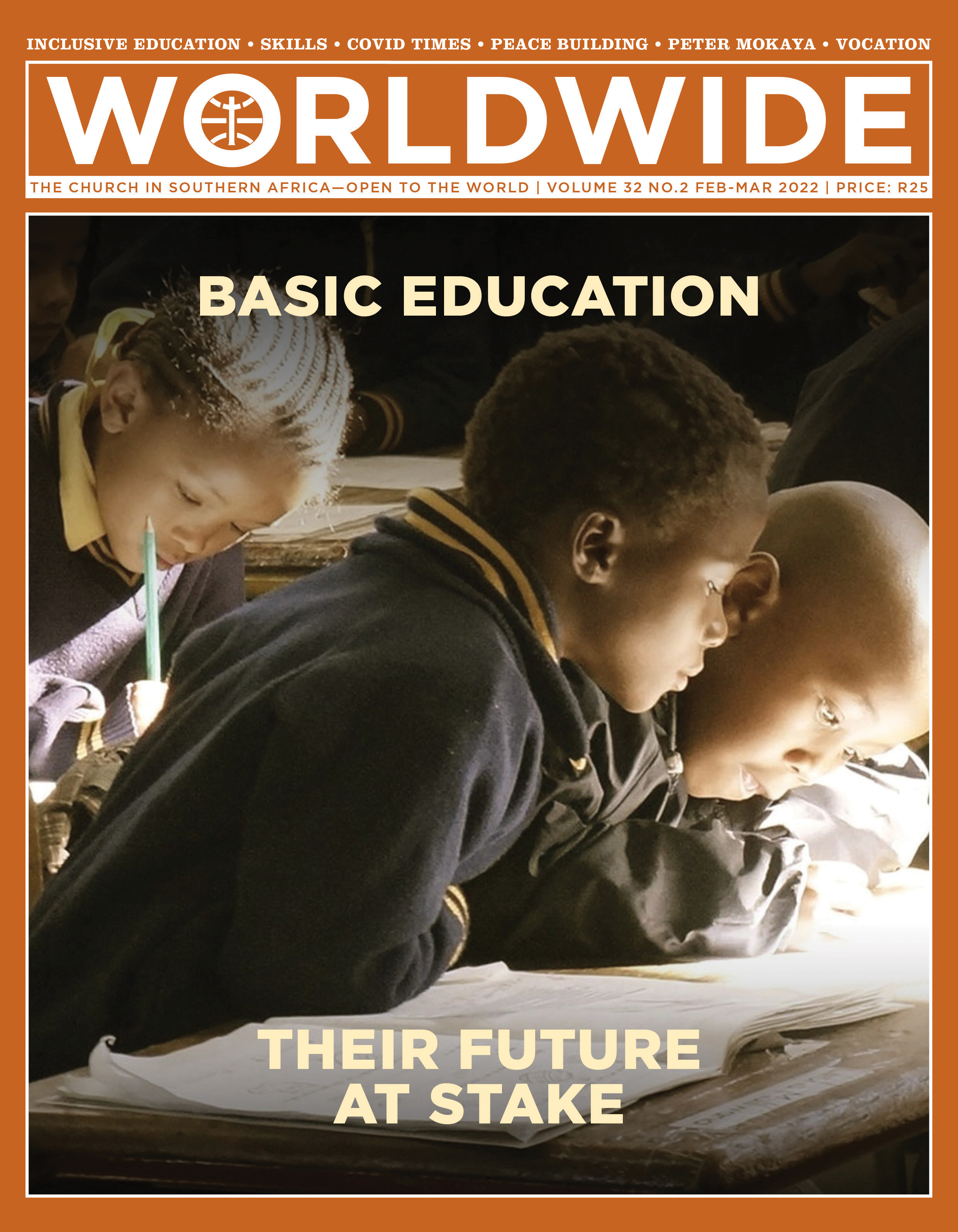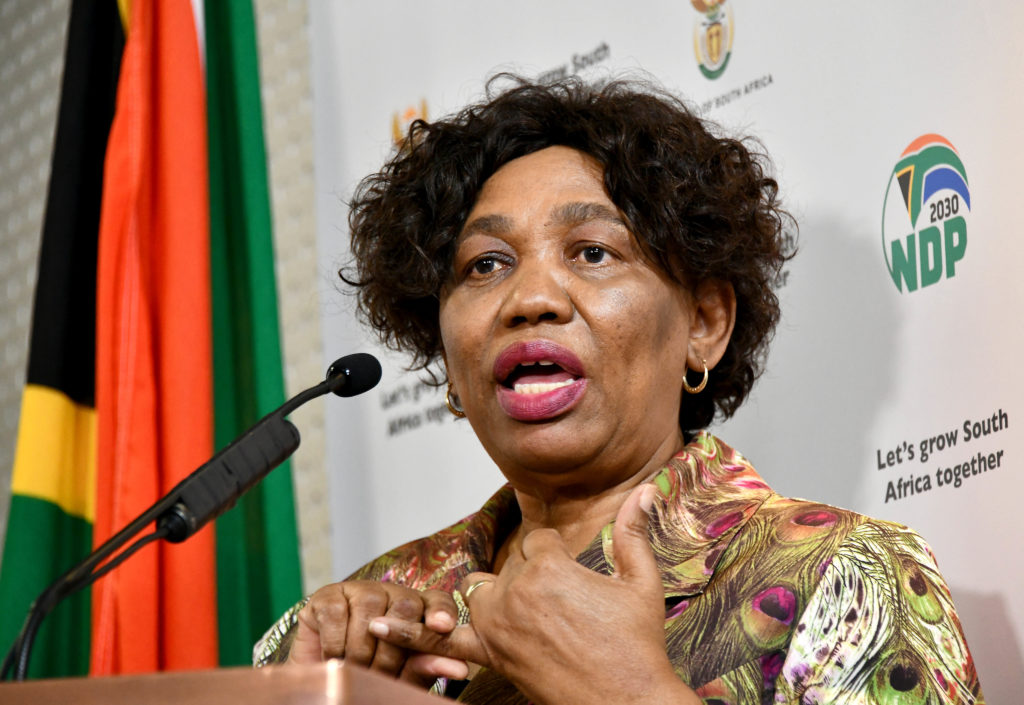
Basic Education Their Future At Stake
The front cover picture was certainly not taken during Covid times. We do not know its exact location, but it could be from any particular school in rural South Africa. What indeed the image of these children reflects is their eagerness for learning and doing it together. Their minds are surely full of dreams; their desires for a bright future cannot be frustrated. The task of offering them an inclusive and integral quality education can look gigantic, but each one’s contribution can make the miracle happen.
Insights • Outcomes

Credit: Government Communication and Information System (GCIS).
Government Fails the Test
BY MIKE POTHIER | PROGRAMME MANAGER, SACBC PARLIAMENTARY LIAISON OFFICE
IN MARCH 2018 a five-year-old girl called Lumka Mkhethwa died after falling into a pit toilet at the Luna Primary School in Bizana‚ Eastern Cape. Four years earlier another five-year-old, Michael Komape, died in similar circumstances at a school in Limpopo. At least another two young children—Lister Magongwa, 7, from Limpopo, and Siyamthanda Mtunu, 6, from the Eastern Cape—also drowned in pit toilets during this period.
After Michael’s death, various commitments were made by the government to eradicate pit toilets at schools, but these did not help Lumka or the others. After her death, President Ramaphosa instructed the Minister of Basic Education, Angie Motshekga, to “conduct an audit of all learning facilities with unsafe structures‚ especially unsafe ablution facilities‚ within a month and to present him with a plan to rectify the challenges‚ as an emergency interim measure while rolling out proper infrastructure‚ within three months”.
That was in August 2018. Now, more than three years later, the SA Human Rights Commission is taking the provincial governments of Mpumalanga, the North West, the Free State, KwaZulu-Natal and the Eastern Cape to court in an effort to force them to close over 3 000 pit toilets at schools, and replace them with safer sanitation facilities.
Clearly, the President’s commitments and the minister’s plans (if any were ever actually made) amounted to very little. There is no great mystery about eradicating pit toilets. If water is available, a septic tank system can be installed. In places where water is a challenge—and there are certainly many rural schools where this is the case—a bucket system can be used until such time as safer and more hygienic long-term solutions are achievable.
What this sad episode illustrates is a failure of governance—a failure by the government to do the simple things effectively and consistently. It could be argued that the field of education exemplifies this failure: every year since 1994, education has received the largest allocation in the national budget (19.4% this year), but it is fairly obvious that we do not receive proper value for such huge expenditure. We rank very low internationally when it comes to numeracy and literacy, for example, and over the years exam success rates have been artificially maintained by reducing the percentage pass requirement to as little as 30%. And, even with such low standards, only just over 40% of children who enter the schooling system emerge with a matric qualification twelve years later.
Again, all this is part of a bigger picture that stretches far beyond just education. Think of everyday things such as postal services, road maintenance and rail transport, not to mention the provision of electricity. In some parts of the country, such as Graaff-Reinet and Makhanda (Grahamstown) in the Eastern Cape, people have to rely on a private organisation, Gift of the Givers, for their drinking water—the government has in effect given up supplying this most basic need.
In fairness, we should note that in some areas government has been doing fairly well—for example, the effort to deal with COVID-19 has been quite impressive and shows what can be achieved when there is sufficient political will. By and large, the social security system also works well, and has been a life-saver for millions of poor South Africans.
Unfortunately, though, the stories of consistent success are relatively few. The trend in the delivery of essential public services, many of which are constitutionally mandated, is downwards, and there is little doubt that the ANC’s poor results in last year’s municipal elections reflect a growing disillusionment among its traditional supporters. When it comes to the essential measures of governance—whether the citizenry can rely on the state to keep them (and their children) safe, and to meet their most basic needs—the government is increasingly failing the test.
| Dates To Remember |
|
February 1 – Blessed Benedict Daswa 2 – World Day of Prayer for Consecrated Life 4 – International Day of Human Fraternity 6 – International Day of Zero Tolerance of Female Genital Mutilation 8 – International Day of Prayer and Awareness against Human Trafficking 11 – International Day of Women and Girls in Science 11 – World Day of the Sick 13 – World Radio Day 20 – World Day of Social Justice 21 – International Mother Language Day March 1 – Zero Discrimination Day 2 – Ash Wednesday 3 – World Wildlife Day 8 – International Women’s Day 15 – St Daniel Comboni’s Birthday 20 – International Day of Happiness 21 – International Day for the Elimination of Racial Discrimination 21 – SA Human Rights Day 22 – World Water Day 24 – World Tuberculosis Day 24 – International Day for the Right to the Truth concerning Gross Human Rights Violations and for the Dignity of Victims 25 – International Day of Remembrance of the Victims of Slavery and the Transatlantic Slave Trade |
